(完整版)高考英语考点总结
高考英语知识点考点总结归纳
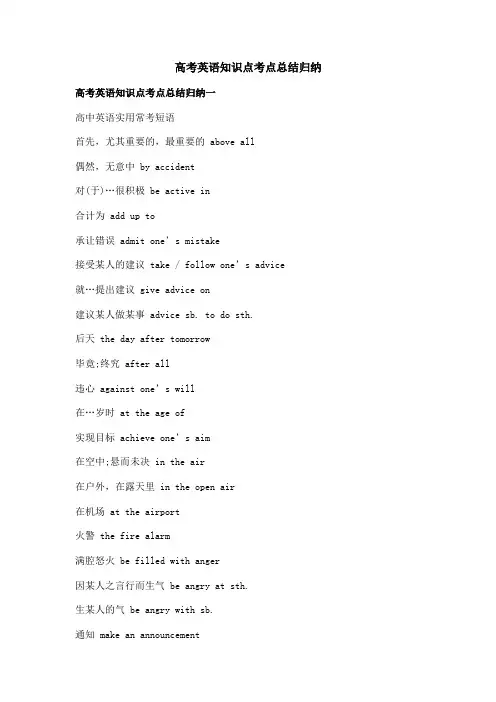
高考英语知识点考点总结归纳高考英语知识点考点总结归纳一高中英语实用常考短语首先,尤其重要的,最重要的 above all偶然,无意中 by accident对(于)…很积极 be active in合计为 add up to承让错误admit one’s mistake接受某人的建议take / follow one’s advice就…提出建议 give advice on建议某人做某事 advice sb. to do sth.后天 the day after tomorrow毕竟;终究 after all违心against one’s will在…岁时 at the age of实现目标achieve one’s aim在空中;悬而未决 in the air在户外,在露天里 in the open air在机场 at the airport火警 the fire alarm满腔怒火 be filled with anger因某人之言行而生气 be angry at sth.生某人的气 be angry with sb.通知 make an announcement相继地,按顺序地 one after another相互,彼此(三者或三者以上之间)one another相互(指两者之间) each other没有回答 give no answer2.考试必备重点单词短语形成…局面;产生 come into being安全带 a safety belt三思而后行。
Second thoughts are best.尽力,尽最大的努力do / try one’s best尽量利用,善用 make the best of一切顺利,万事如意 all the best黑体地,粗体地 in bold出身于农民家庭be born in a peasant’s family 鞠躬 make a bow动动脑子use one’s brains打破纪录 break the record深吸一口气 take a deep breath屏息;憋住气hold one’s breath上气不接下气 out of breath刷牙brush one’s teeth突然哭起来 burst into tears突然一阵大笑 a burst of laughter要不是 but for呼救声 a call for help保持镇静(别慌) keep calm保持安静(别吵) keep quiet保持不动(别动) keep still保持沉默(别说话) keep silent夏令营 a summer camp去野营 go camping情不自禁… cannot help doing打牌 play cards照顾,保管 take care of医疗护理 medical careanything but 一点也不anything like 像……那样的东西anywhere near 接近于apart form 除……之外尚有apply to 向……申请,适用于appreciation of 对……的欣赏argue against 反对as a result of 作为……的结果,由于高考英语知识点考点总结归纳二感叹句感叹句:一般是用来表示说话时的喜悦、惊讶等情感。
高考英语必背知识点及常考点大全
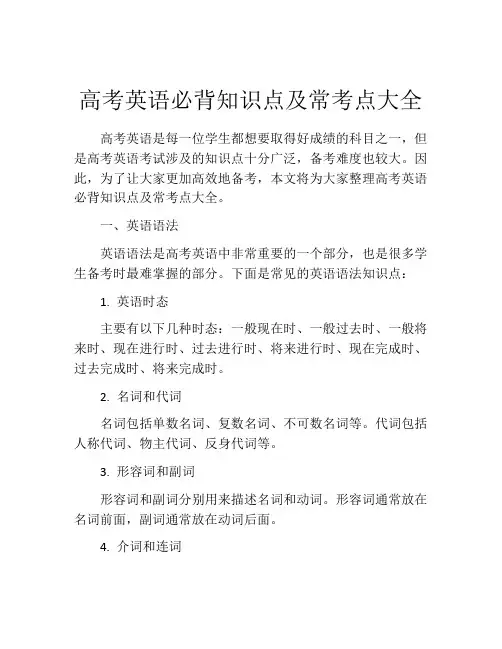
高考英语必背知识点及常考点大全高考英语是每一位学生都想要取得好成绩的科目之一,但是高考英语考试涉及的知识点十分广泛,备考难度也较大。
因此,为了让大家更加高效地备考,本文将为大家整理高考英语必背知识点及常考点大全。
一、英语语法英语语法是高考英语中非常重要的一个部分,也是很多学生备考时最难掌握的部分。
下面是常见的英语语法知识点:1. 英语时态主要有以下几种时态:一般现在时、一般过去时、一般将来时、现在进行时、过去进行时、将来进行时、现在完成时、过去完成时、将来完成时。
2. 名词和代词名词包括单数名词、复数名词、不可数名词等。
代词包括人称代词、物主代词、反身代词等。
3. 形容词和副词形容词和副词分别用来描述名词和动词。
形容词通常放在名词前面,副词通常放在动词后面。
4. 介词和连词介词和连词用来连接词语,介词通常放在名词或代词前面,连词用来连接词语或句子。
5. 句型常见的句型有陈述句、疑问句、祈使句、感叹句等。
二、词汇高考英语中,词汇量是很重要的一个方面。
下面是高考英语常见的词汇知识点:1. 同义词和反义词同义词指的是意思相同或相近的词,反义词则指的是意思相反的词。
2. 前缀和后缀前缀和后缀指的是词根前面或后面的一些字母,用来改变词义。
3. 词形变化词形变化指的是单数名词变成复数名词,动词变化成不同的时态等。
4. 词义辨析词义辨析指的是相似但细微差异的单词之间的区别,如effect和affect等。
三、阅读理解阅读理解是高考英语中的重头戏,通常占据比较多的分数,因此要认真准备。
下面是阅读理解需要注意的知识点:1. 词汇理解要能够正确理解课文中的词汇,而不是仅根据字面去理解,同时还要掌握一些固定的短语和表达方式。
2. 语法分析要能够正确理解课文中的语法结构,包括句子主谓宾、修饰语、同位语等。
3. 推理判断要能够根据课文中的信息进行推理和判断,并能够理解作者的观点和态度。
四、写作高考英语中的写作部分通常包括作文和翻译。
高考英语知识点全面归纳总结
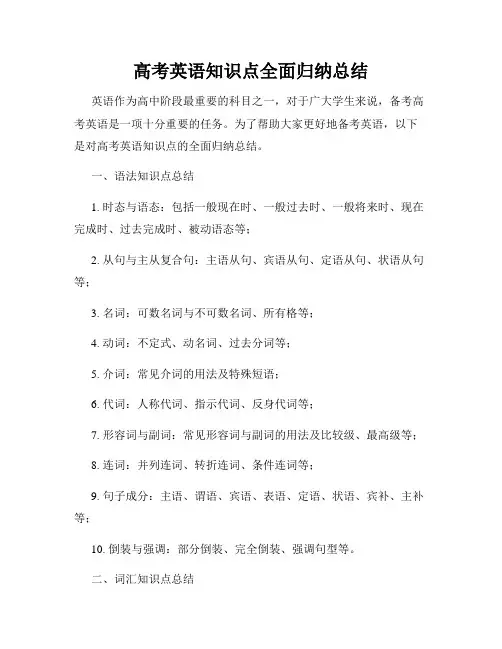
高考英语知识点全面归纳总结英语作为高中阶段最重要的科目之一,对于广大学生来说,备考高考英语是一项十分重要的任务。
为了帮助大家更好地备考英语,以下是对高考英语知识点的全面归纳总结。
一、语法知识点总结1. 时态与语态:包括一般现在时、一般过去时、一般将来时、现在完成时、过去完成时、被动语态等;2. 从句与主从复合句:主语从句、宾语从句、定语从句、状语从句等;3. 名词:可数名词与不可数名词、所有格等;4. 动词:不定式、动名词、过去分词等;5. 介词:常见介词的用法及特殊短语;6. 代词:人称代词、指示代词、反身代词等;7. 形容词与副词:常见形容词与副词的用法及比较级、最高级等;8. 连词:并列连词、转折连词、条件连词等;9. 句子成分:主语、谓语、宾语、表语、定语、状语、宾补、主补等;10. 倒装与强调:部分倒装、完全倒装、强调句型等。
二、词汇知识点总结1. 同义词与近义词辨析;2. 常见词汇搭配与习惯用语;3. 前缀与后缀的构词法;4. 常见冷门词汇;5. 高频词汇记忆与应用。
三、阅读理解知识点总结1. 阅读技巧与策略:主旨题、细节题、推理题等;2. 词义猜测与句意理解;3. 阅读材料类型:记叙文、说明文、议论文、应用文等;4. 阅读技巧与解题步骤;5. 常见题型辨析与解答方法。
四、写作知识点总结1. 写作结构与篇章连贯:开头、结尾、段落划分等;2. 写作技巧与表达准确性;3. 作文类型:记叙文、说明文、议论文、应用文等;4. 段落写作与句子优化;5. 作文评分标准与改进方案。
五、听力技巧与知识点总结1. 听力材料类型:对话、独白、讲座等;2. 常见听力题型与解题技巧;3. 听力策略与准确度;4. 常见听力场景与对话表达;5. 听力原文理解与复述。
综上所述,高考英语的备考无非考察语法、词汇、阅读理解、写作和听力技巧等方面的知识点。
只有全面系统地掌握这些知识,才能够更好地应对高考英语,取得理想的成绩。
高考英语考纲100个高频考点总结
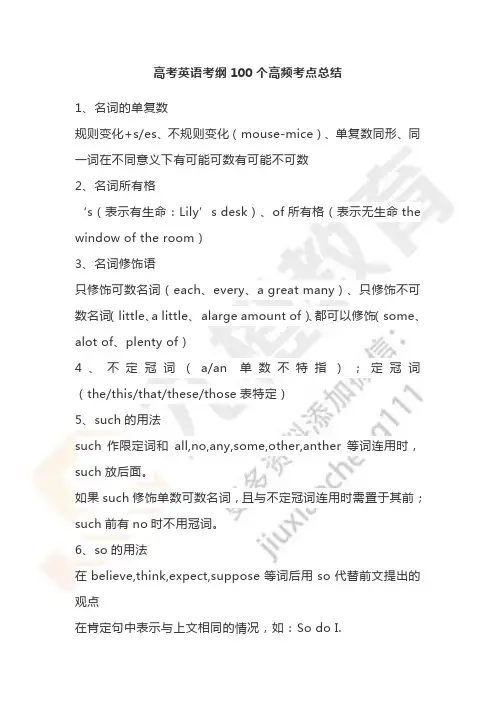
高考英语考纲100个高频考点总结1、名词的单复数规则变化+s/es、不规则变化(mouse-mice)、单复数同形、同一词在不同意义下有可能可数有可能不可数2、名词所有格‘s(表示有生命:Lily’s desk)、of所有格(表示无生命the window of the room)3、名词修饰语只修饰可数名词(each、every、a great many)、只修饰不可数名词(little、a little、alarge amount of)、都可以修饰(some、alot of、plenty of)4、不定冠词(a/an单数不特指);定冠词(the/this/that/these/those表特定)5、such的用法such作限定词和all,no,any,some,other,anther等词连用时,such放后面。
如果such修饰单数可数名词,且与不定冠词连用时需置于其前;such前有no时不用冠词。
6、so的用法在believe,think,expect,suppose等词后用so代替前文提出的观点在肯定句中表示与上文相同的情况,如:So do I.7、all和both的用法all三者或三者以上全部都,both二者都。
all指整体或抽象事物时当做单数,指人时当做复数。
both做主语时,谓语动词用复数。
8、many修饰或替代可数名词,much修饰或替代不可数名词many a 许多(谓语动词用单数)a good/greatmany很多as many as/asmuch as一样多、差不多9、little几乎没有,修饰不可数名词a little有一点,修饰不可数名词few几乎没有,修饰可数名词a few有一点,修饰可数名词耶鲁学姐笑笑说夜幕来领,你却不在身边#英文歌#英语歌曲#情感#英语视频号10、形容词比较级最高级原级比较:…is as good asmine.表示少于或超过另一方:fewer than, morethan易混淆短语:as well as也…既…as far as就…而言11、比较级常见错误:用much表强调时的误用She looks more younger than I.(×)She looks much younger than I.(√)12、介词短语重点except for除了in place of代替on behalf of代表but for要不是in front of在…前面13、介词across, over, through, past四个常考介词的区别across 横穿穿越,发生在物体表面over 跨过越过,发生在物体上方through 穿过,发生在某物空间内past 从旁经过14、易混淆的介词短语in all总共after all毕竟at all根本,常用在否定句中表强调above all最重要的是,尤其是15、序数词前一定要加定冠词the,改错常考,序数词与基数词连用时,序数词放在前面,如the first one。
2024高考英语必背知识点及常考点大全
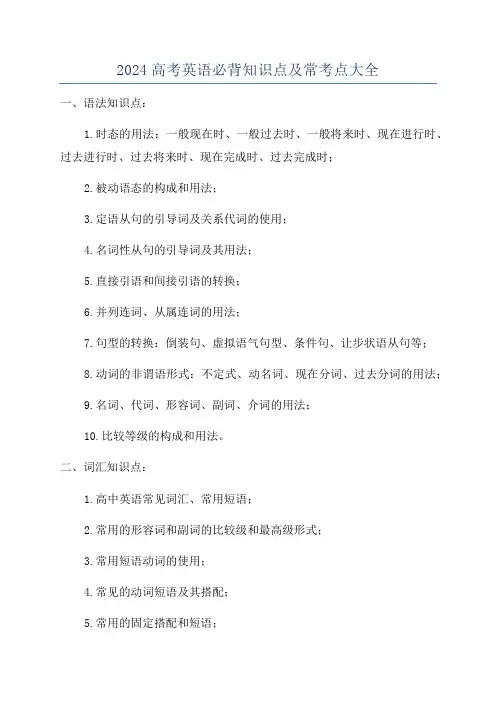
2024高考英语必背知识点及常考点大全一、语法知识点:1.时态的用法:一般现在时、一般过去时、一般将来时、现在进行时、过去进行时、过去将来时、现在完成时、过去完成时;2.被动语态的构成和用法;3.定语从句的引导词及关系代词的使用;4.名词性从句的引导词及其用法;5.直接引语和间接引语的转换;6.并列连词、从属连词的用法;7.句型的转换:倒装句、虚拟语气句型、条件句、让步状语从句等;8.动词的非谓语形式:不定式、动名词、现在分词、过去分词的用法;9.名词、代词、形容词、副词、介词的用法;10.比较等级的构成和用法。
二、词汇知识点:1.高中英语常见词汇、常用短语;2.常用的形容词和副词的比较级和最高级形式;3.常用短语动词的使用;4.常见的动词短语及其搭配;5.常用的固定搭配和短语;6.常用的形容词和副词的词义辨析;7.常用的同义词和反义词。
三、阅读理解知识点:1.阅读理解题型的特点及解题技巧;2.看图作文的写作方法;3.阅读理解中的细节题、推理题、主旨题、态度题的解题方法;4.阅读文章的整体理解能力;5.根据语境猜测词义的能力。
四、写作知识点:1.话题作文的写作思路和方法;2.议论文的写作结构及篇章组织方法;3.日记、书信、邀请函等文体写作方法;4.图画作文的写作技巧和常用句型;5.口头表达的技巧和常用句型。
五、听力知识点:1.听力题型的特点及解题技巧;2.长对话和短文听力的理解能力;3.根据听力材料获取信息的能力;4.根据听力材料进行推理的能力。
六、常见考点:1. 动词搭配:look forward to、take part in、get along with、pay attention to等;2. 名词单复数形式:sheep、fish、information、furniture等;3.冠词的用法:不定冠词、定冠词、零冠词;4.代词的指代关系、人称和数的一致性;5. 并列连词的用法:and、but、or、so、for、yet等;6.计算时间、距离、速度的表达方式;7.比较等级:原级、比较级、最高级。
高考英语知识点总结(超全版)
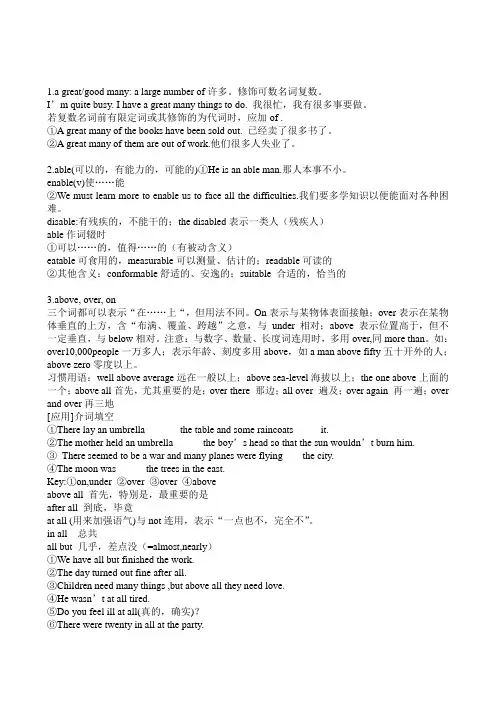
1.a great/good many: a large number of许多。
修饰可数名词复数。
I’m quite busy. I have a great many things to do. 我很忙,我有很多事要做。
若复数名词前有限定词或其修饰的为代词时,应加of .①A great many of the books have been sold out. 已经卖了很多书了。
②A great many of them are out of work.他们很多人失业了。
2.able(可以的,有能力的,可能的)①He is an able man.那人本事不小。
enable(v)使……能②We must learn more to enable us to face all the difficulties.我们要多学知识以便能面对各种困难。
disable:有残疾的,不能干的;the disabled表示一类人(残疾人)able作词辍时①可以……的,值得……的(有被动含义)eatable可食用的,measurable可以测量、估计的;readable可读的②其他含义:conformable舒适的、安逸的;suitable 合适的,恰当的3.above, over, on三个词都可以表示“在……上“,但用法不同。
On表示与某物体表面接触;over表示在某物体垂直的上方,含“布满、覆盖、跨越”之意,与under 相对;above表示位置高于,但不一定垂直,与below相对。
注意:与数字、数量、长度词连用时,多用over,同more than。
如:over10,000people一万多人;表示年龄、刻度多用above,如a man above fifty五十开外的人;above zero零度以上。
习惯用语:well above average远在一般以上;above sea-level海拔以上;the one above上面的一个;above all首先,尤其重要的是;over there 那边;all over 遍及;over again 再一遍;over and over再三地[应用]介词填空①There lay an umbrella_______the table and some raincoats _____it.②The mother held an umbrella______the boy’s head so that the sun wouldn’t burn him.③There seemed to be a war and many planes were flying____the city.④The moon was______the trees in the east.Key:①on,under ②over ③over ④aboveabove all 首先,特别是,最重要的是after all 到底,毕竟at all (用来加强语气)与not连用,表示“一点也不,完全不”。
高考英语知识点全总结
高考英语知识点全总结作为中国学生的重要考试之一,高考英语一直备受关注。
掌握好英语知识点是取得优异成绩的关键。
在这篇文章中,我们将对高考英语常见的知识点进行全面总结,帮助同学们更好地备考。
一. 语法知识点1. 时态:英语中的时态包括一般现在时、一般过去时、现在进行时、过去进行时、一般将来时等。
了解各个时态的用法和构成十分重要。
2. 主谓一致:动词的单复数形式要与主语保持一致。
句子中有连接词“and”时,谓语动词使用复数形式。
3. 被动语态:被动语态的构成是由“be”动词加上及物动词的过去分词形式。
掌握被动语态的用法和时态的转换是必须的。
4. 并列连接词:常见的并列连接词有and、but、or、so、for等,要掌握它们在句子中的适用范围和用法。
5. 条件状语从句:条件状语从句是用来表示某种条件或前提的从句,常用的引导词有if、unless、as long as等。
了解条件状语从句的句型和用法对于理解和构建复杂句子非常重要。
二. 词汇知识点1. 同义词和反义词:掌握同义词和反义词的用法可以帮助你更好地理解文本内容。
2. 词性转换:掌握名词、动词、形容词、副词等词性之间的转换非常重要。
例如,形容词可以通过在后面加上-ly变成副词。
3. 词根和词缀:掌握一些常见的词根和词缀可以帮助你更好地理解和记忆生词。
4. 短语和习语:掌握常见的短语和习语可以帮助你更自然地表达自己的意思。
5. 词义辨析:熟悉一些容易造成歧义的词语,可以帮助你避免在理解和表达中的错误。
三. 阅读理解技巧1. 快速阅读:在考试中,时间非常宝贵。
快速阅读可以帮助你获取文章的整体信息,提高答题效率。
2. 找关键词:阅读理解中常常会有一些关键词,理解了这些关键词可以帮助你更好地解题。
3. 排除法:如果你不确定答案,可以通过排除一些明显错误的选项,增加正确选项的概率。
4. 文章结构分析:了解文章的结构可以帮助你更好地理解文章的逻辑关系,同时更准确地回答问题。
(完整版)高考英语考点大全,推荐文档
. . 6.第 1 课一、Language Points 1. shar espar v. 分享、合用:share sth with sbn. 一份,股份a. 业余的,备用的:spare time, a spare 9. mostmost of the +n.(pl)/pron. the majority of (the) mostly: 主要地(状) e tire v. 抽出,匀给:spare me five minutes/spare one of sandwiches for the boyspare no efforts :不遗余力spare no expense :不惜工本save v. 节省,救出2. He felt lucky to have survived the war.3. with sb about/over sth :和某人就某事争论 10be equal to sth :与…相等 be equal to (doing) sth :胜任(做)某事equal sth :与…相等 equal sb in sth :在…方面与某人匹敌 11. compare…to/with… compared to/with…12 a great many.argu e for/against sth :赞成/反对…Sb into/out of (doing) sth :说服某人做/不做某事 several/two dozen/hundred +n.(pl.)(many) dozens ofa great many of +the/these/those+n.(pl.) seveal/two dozen of +pron.4. have/make/let/see/watch/listen to +宾+宾补(do/doing/done)get sb to do sth have+宾+宾补(to do/to be done)5. So+同一主语+助动词So/neither/nor+助动词+另一主语So it is/was with+另一主语should/oughtto/need/could/might/would+do/have done13much too+adj/adv(原级) too much+n.(u.)14 too many+n.(pl.)没有被动态. come about(主要用于疑问句、否定句) happen(表示偶然、碰巧之意) sth+ take place(多表示有组织、有计划) 7. except/but/except for/except that/except wh- clause besides/in addition apart from but for=without 8. The first time+从句 For the first time :作时间状语15起….break out(指战争、灾害、疾病等的爆发)occur(与 happen 通用) It occurs to sb that/to do…:某人突然想n./pron./adj./adv./prep-phrase to do :表将来It’s the first time+that -clause(完成时)the first+名词+to doWith+宾+宾补 doing :表正在进行 Done :表过去 16. 强调句型的判断方法:如果将句子中的“it be”和“that”去掉,原句通顺则是强调句,否则就不是强调句。
高考英语知识点总结超全版
高考英语知识点总结超全版高考英语是每个考生都面对的一场重要考试,它涵盖了听力、阅读、写作和翻译等多个方面,要求考生对英语的基本知识有着牢固的掌握。
在这篇文章中,我将为大家总结一些高考英语的重要知识点,希望能帮助广大考生在备考过程中有所帮助。
一、语法知识点1. 时态:一般现在时、一般过去时、一般将来时、现在进行时、过去进行时等。
2. 名词:可数名词、不可数名词、复数名词的构成及用法。
3. 代词:人称代词、物主代词、反身代词、相互代词的用法。
4. 冠词:定冠词和不定冠词的用法。
5. 形容词和副词:形容词的比较级和最高级、副词的构成和用法。
6. 介词和连词:常见的介词、介词短语和固定搭配,连词的用法。
7. 句子结构:主谓结构、主系表结构、倒装句、条件句、非谓语动词等。
二、阅读技巧阅读理解部分是高考英语中最重要且占比最大的一个部分。
以下是一些阅读技巧,可帮助你更好地完成这一部分的题目。
1. 了解题型:高考阅读理解题型主要包括主旨题、细节题、推理题和态度题。
2. 有针对性地读题:在读文章之前,先读题了解题目要求,帮助你更有针对性地寻找答案。
3. 理清篇章结构:通读全文,了解文章的整体结构,这能帮助你更好地理解文章的内容。
4. 提炼关键信息:在阅读中提炼出关键词、关键句,以帮助你更准确地找到答案。
5. 多做练习:多做一些阅读理解的练习题,提高你的阅读理解能力和答题速度。
三、写作技巧写作是高考英语中的一大重点,以下是一些写作技巧,帮助你更好地应对写作部分的考题。
1. 明确写作类型:高考写作常见的类型有记叙文、说明文、议论文等,要根据题目的要求明确写作类型。
2. 抓住主题:写作时要始终抓住主题,不要跑题,避免内容杂乱无章。
3. 合理安排结构:写作时要先明确段落之间的逻辑关系,合理安排结构,使文章层次清晰。
4. 用好连接词:使用适当的连接词,如首先、其次、最后等,使文章过渡自然。
5. 注重语法和拼写:注意语法错误和拼写错误,使用正确的句式和单词,提高文章的语言准确性。
高考英语必背的知识点归纳
高考英语必背的知识点归纳高考英语必背的知识点归纳英语是高考是必考的的科目,也是很多学生的薄弱科目,因此高考前的知识复习要十分重视。
下面是店铺为大家整理的高考英语必背的知识点,希望对大家有用!高考英语知识点归纳1. 一般现在时①表示客观事实或普通真理(不受时态限制) Water boils at 100oC.②表示现状、性质、状态时多用系动词或状态动词;表示经常或习惯性的动作,多用动作动词,且常与表频率的时间状语连用。
Ice feels cold.We always care for each other and help each other.③表示知觉、态度、感情、某种抽象的关系或概念的词常用一般现在时:see、hear、smell、taste、feel、notice、agree、believe、like、hate、want、think、belong seem等。
如: I know what you mean.Smith owns a car and a house.All the students here belong to No.1 Middle School.④在时间、条件状语从句中常用一般现在时代替将来时。
但要注意由if 引导的条件状语从句中可以用shall或will表“意愿”,但不表示时态。
如果你愿意接受并参加我们的舞会,我的家人会非常高兴。
⑤少数用于表示起止的动词如come、go、leave、arrive、fly、return、start、begin、pen、close、end、stop等常用一般现在时代替将来时,表示一个按规定、计划或安排要发生的动作。
当be表示根据时间或事先安排,肯定会出现的状态,只用一般现在时。
The shop closes at 11:00 p.m. every day.高考英语知识重点as;which引导定语从句异同as, which 都能引导限制性或非限制性的定语从句。
- 1、下载文档前请自行甄别文档内容的完整性,平台不提供额外的编辑、内容补充、找答案等附加服务。
- 2、"仅部分预览"的文档,不可在线预览部分如存在完整性等问题,可反馈申请退款(可完整预览的文档不适用该条件!)。
- 3、如文档侵犯您的权益,请联系客服反馈,我们会尽快为您处理(人工客服工作时间:9:00-18:30)。
高考英语必备(个人整理)1. To one’s+ 情感名词Eg: To my surprise, he did very well in his previous job.令我吃惊的是,他在之前的那份工作中也干的不错。
( To one’s surprise 是固定搭配)用于该结构的名词常见的有admiration (羡慕), amazement (惊奇), amusement (娱乐), annoyance (烦恼), astonishment (惊奇), delight (欣喜), despair(绝望), disappointment(失望), embarrassment(难堪), happiness(幸福), horror (恐怖), joy (高兴), puzzlement (疑惑), regret (遗憾), relief (如释重负), satisfaction (满意), shame (羞愧), sorrow (悲伤), surprise (惊讶)等。2.beside/besidesbeside是一个介词,表示在...的旁边,相当于by:而besides是一个副词,也可作介词,表示除了...还有...Eg:Don’t stand beside me. 不要站我旁边I am outgoing. Besides, I am helpful. 我很外向。
此外,我还乐于助人。
besides和except的区别都可解作“除……之外” 但含义不同。
except 表示“从所提到的人或事物中除去,即从整体中除去一部分”,表示递减的概念,含义是否定的。
besides表示“除了……之外,还有……”,指“在整体中加入一部分”,表示递加的概念,含义是肯定的。
试比较:①We all went except him. 除他之外,我们都去了。
(他没有去)②We all went besides him. 除他之外,我们大家也都去了。
(他也去了)3.See/ look/ watchSee 看见了(强调看的结果)Did you see it?你看见了吗?Look 意为看,瞧(强调动作)Look at the blackboard. 请看黑板。
Watch 观看,注视(形容观看的内容比较精彩,比较有过程)watch a game/watch a fight 看比赛,观看打斗(看得东西都比较有内容)常见短语:see sb doing sth(看见某人正在做...,doing作sb 的宾补)see sb do sth (看见某人做了...,强调看了整个过程)See a movie/ film 看电影Look like 看起来像.../ Look for... 寻找.../ have a look at看一看/ look at 看着(glare at 怒视/ stare at 盯着看/ glance at 一瞥)Watch TV看电视look out= watch out 担心,小心4.Hear / listenListen 不及物动词,表示有意识地听、仔细听,强调的是听的动作Listen to music 听歌Listen to me. 听我讲。
Hear 及物动词,强调听的结果I can’t hear you!我听不见你。
5.So/ suchsuch与so的意思都是“如此,这样”.但两者用法根本不同,与what和how引导的感叹句相类似.1、such后面主要是修饰名词.即:such+a/an+adj.+n.或a/an+such+adj.+n..如果名词是不可数名词或复数名词,则不可以用不定冠词a或an.如:①He has such a beautiful bike.We all go to see it.②It's a such fine day.We all want to go to fly a kite.2、so后面只能跟形容词或副词.即:和so+adj.或adv.不过,so后面也可以跟名词,但该名词必须是单数可数名词.用法为:so+形容词+a或an+单数可数名词.如:①The tiger is so big.And the cat is so small.②She is so lovely a girl.3、它们后面还可以与that从句连用.即:such…that和so…that意思是“如此……以致……”.如:①She is such a clever girl that she can make much progress in math exam.②His brother is so young that he can't go to school.注:当名词前的形容词为表示数目的词时,such必须换成so.如:①There are so many people that we can't go past.②I ate so much food that I didn't want to go any farther.6.how/ what (how about= what about ...怎么样?)what、how常用于感叹句感叹句一般是用来表示说话时的喜悦、惊讶等情感。
英语感叹句常用"what"和"how"引导,"what"和"how"与所修饰的词置于句首,其它部分用陈述句语序。
一、由"what"引导的感叹句:"what"意为"多么"用作定语,修饰名词(被强调部分),单数可数名词前要加不定冠词a/an,复数可数名词或不可数名词前不用冠词。
这类句子的结构形式是:what+(a/an)+adj.+n.+主语+谓语+(it is).如:① What a clever girl she is!多么聪明的姑娘呀!② What an interesting story it is!多么有趣的故事呀!③ What delicious food it is!多么有味的食物呀!二、由"how"引导的感叹句:"how"意为"多么",用作状语,修饰形容词或副词(被强调部分)。
如果修饰形容词,则句中的谓语动词用系动词;如果how修饰副词,则句中的谓语动词用行为动词,这类句子的结构形式是:How+adj.(adv.)+主语+谓语+(it is).如:① How cold it is today!今天多么冷呀!② How well she sings!她唱得多好呀!三、在表示同一意义时,英语感叹既可用"what"引导,也可用"how"引导。
如:① What a hot day it is! = How hot the day is !多么热的天气呀!② What bad weather it is! = How bad the weather is!多么糟糕的天气呀!四. What do you do?你是做什么的How do you do it?你是怎样做的7. Sometimes,sometime 和some time 的区别(1)sometimes的意思是“有时”,是副词.例如:Sometimes he comes by bike and sometimes by bus.他有时骑车来,有时乘公共汽车来.(2)sometime也是副词,意思是“在某个时候”.可用于一般过去时与将来时.例如:You can hand in your homework sometime before Friday.你可以在周五前某个时候交作业.(3)some time是名词短语,它的意思是“一段时间”.例如:I'll be away for some time.我将离开一段时间.8.表示“非常多”修饰可数名词复数或不可数名词不可数名词前可用:much, a little, a great deal of, a large amount of可数名词前可用:many, a few, a great many ,a large number of既可以修饰可数名词又可以修饰不可数名词的有:lots of,a lot of, plenty of,a great quantity of.9.another,the other,other, others.another(三个及以上之中)另一个the other(两个中)另一个other +n (other 是一个形容词)others n. =other+n(pl.)Eg:I am sorry,but can you give me another chance?Peter has two sons. One is six and the other is just two years old.We need to care about other people= we need to care about others.10.就近原则:1.There be 句型There is a book and some pencils on the desk.=There are some pencils and a book on the desk.2.neither...nor...Neither you nor he is right.= Neither he nor you are right.3.either...or...Either they or Jim is going to Shanghai next Saturday.= Either Jim or they are going to shanghai next Saturday.4.not only...but also...Not only Ann but also her parents stay at home every Sunday.= Not only Ann's parents but also she stays at home every Sunday.就远原则有一类连接词,其后的谓语动词要与连接词前一部分的主语保持一致.此类连接词有with, along with,together with,as well as,besides,like,without, except (but),including等.例如:Lisa, as well as her parents, was invited by Jack. 丽萨和爸妈都被邀请了!Tracy,like many girls,loves dancing.特蕾西像很多女孩一样,喜欢跳舞.All the students,including Tom,are leaving.所有的学生,包括汤姆都走了.No one except (but) me knows about this news.除了我没有人知道11.关于元音字母和元音音节元音字母总共有五个 a e i o u但决定用冠词 a 还是an 取决于后面的单词首字母是不是元音因素(1).A book, a useful book, a European country, a university, a unique man.【这些单词中的U 都发[ju:],这是一个辅音音节】(2).An umbrella,an apple,an hour, an honest man 【h 不发音】12.星期和月份(week / month)Monday星期一Tuesday 星期二Wednesday 星期三Thursday星期四Friday 星期五Saturday 星期六Sunday 星期天January一月February 二月March 三月April 四月May 五月June 六月 July 七月August 八月September 九月October 十月November 11月December 12月James Paul McCartney was born in 1942.James Paul McCartney was born in June 18th,1942.13.时间的读法What time is it now?---It is 9:00 /9:05/9:15/ 9:30/9:45 now.Nine o’clock/ nine o five/ nine fifteen(a quarter past nine)/ nine thirty(half past nine )/ nine forty-five (a quarter to ten)一分钟a minute 一秒a second 一小时an hour 一刻钟a quarter14.方位和位置East south west north center right leftSoutheast southwest _______(东北)________(西北)in表示A地在B地范围之内。
